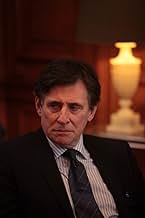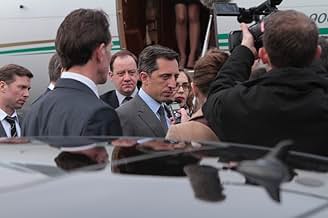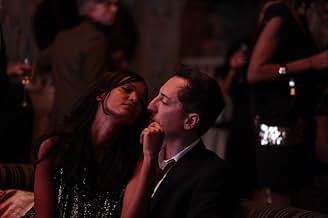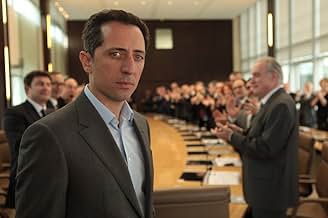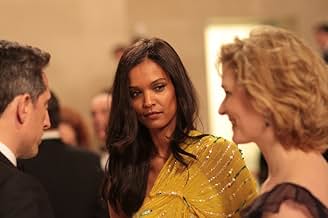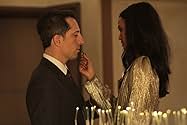NOTE IMDb
6,5/10
5,8 k
MA NOTE
Le nouveau PDG d'une grande banque d'investissement européenne s'accroche à son siège lorsqu'un fonds spéculatif américain tente de racheter sa société.Le nouveau PDG d'une grande banque d'investissement européenne s'accroche à son siège lorsqu'un fonds spéculatif américain tente de racheter sa société.Le nouveau PDG d'une grande banque d'investissement européenne s'accroche à son siège lorsqu'un fonds spéculatif américain tente de racheter sa société.
- Réalisation
- Scénario
- Casting principal
- Récompenses
- 1 victoire et 2 nominations au total
Avis à la une
Let's continue to rob the poor and make the rich richer!" this is what about the modern day banking and financing (undre)world, banks are just like Mafia, bankers Mafiosos, banks' CEO in private jet doing country hopping, hiring retired cop to do the dirt-digging and trashcan/dumpster diving jobs, committing some adultery flirting with high priced model- hooker, back-stabbing while self defense, behind the door deals, estranged to parents, wives, kids, fence off hostile takeover, firing the employees as many as possible, no gender and age are safe, laying off more, the stockholders will be happier and the stock will be rocketing. so, indeed "money is not a tool but a master, serving him well and he'll reward you generously". so let's continue to rob the poor blind and serve the rich loyally. what a great movie, very tense and thrilling, great montage, lot of exotic locations in different countries. this is a very nicely done movie, quite worth watching.
It's interesting that Costa-Gavras chose to make a personal diatribe against finance through his "Capital" since he's most renowned for his politically-oriented themes that contributed to such memorable movies as "Z" or "Missing". I say 'interesting' because "The Capital" reminded me of another finance-themed film from another political director: Oliver Stone's "Wall Street", THE movie that summed up the inner amorality of finance through the iconic : 'Greed, for a lack of better word, is good'
I wasn't surprised that the political director made his cinematic "J'accuse" against finance, since it proved to be true ruler of our liberal world, whose only alibi for existence is to pretend there's no better alternative. After the economical crisis, the Goldman Sachs and Bernard Madoff' cases, after the French President claimed to have made finance his enemy, finance was definitely political matter, and if Costa-Gavras makes a film about it, it's certainly worth our attention. The question is: what would the film show that "Wall Street" didn't? (and this comes from someone who didn't even watched its sequel, "The Wolf of Wall Street" or "Margin Call", not yet)
I expected the most overused clichés from "The Capital", the young ambitious yuppie (Gad El Maleh) riding a fast ascension, his discovery of a world of corruption, lust and greed, ethical dilemmas, probable redemption etc. And the casting of Gad El Maleh didn't comfort my thoughts. Gad (as he's generally called) is one of the most popular comedians in France, but his transition from stage to cinema didn't bring much positive results. His "Chouchou" and "Coco", both cinematic adaptations of popular sketches were critically panned, much more; Gad never really struck as a serious comedian, and was never considered an equal to Jean Dujardin or Vincent Cassel, to give you an idea.
Then I looked at the trailer and was already cringing at his crisped face, he was obviously trying to inhabit the gravity of the subject by playing the tough-guy, and if it doesn't work for Di Caprio, it's even worse for him. The trailer gave away the most archetypal situations, the corrupt bankers, the cynical American, the sexy top-model, the fast-paced editing and the obligatory round trips between Paris, New York, London and Tokyo. I really didn't expect much, and watching the film was almost accidental. The film was a commercial bomb, and even Gad's popularity didn't help, or were people tired of the subject? I guess I wanted to see where I would stand for, and my expectations were so low they could only be positively contradicted.
The first good point relies on the straight-forward narrative, Marc Tourneuil (Gad El Maleh) is not the Boy Scout that would make a perfect puppet for his hierarchy: he understands the malevolent schemes behind his nomination as a CEO of Phenix bank, replacing the former, cancerous President. He knows he has the opportunity of a lifetime to win money and be the master of his own actions. That's a first deviation from the usual 'selling-soul-to-the-devil' plot and it was quite refreshing to see a character who already embraced the cynicism of his environment. The film turns immediately into a chess game involving Tourneuil, the board members, the head of an American hedge fund (Gabriel Byrne), and in a zero-sum game, we expect only one winner.
Indeed, it doesn't take a MBA degree to understand the plot, complex but not contrived. In a nutshell, it's all about finding the tricks to distract the French government from a plan of mass-layoffs in order to increase Phenix' profitability, there are many cases of insider trading, of political maneuvers, fiscal exits and such expectable lines as 'money never sleeps'. The film tries to cover every aspect of finance, succeeding by not making it feel too forced or cliché. However, this owes more to the story than the acting or the script. Gad delivers a fine performance but there are moments where his character didn't exactly know what to do, and I suspect it was the actor lacking the right direction. Gad proved to be an actor of fair capabilities and his performance alternates between some powerful outbursts to awkward lines' deliveries where he's never totally Gordon Gekko, and can't convince as a Buddy Fox.
It's regrettable because Costa-Gavras had the material for a good film, not the most subtle one, but for a gripping thriller and fair entertainment. Yet he polluted it with some unnecessary subplots such as a dull romance with a top model. The film skates over the difficult compatibility between Marc's job and his private life, there are some moments with his wife and his family that could have been fueled with more energy and self-questioning, after all, wouldn't we be interested to see a businessman with a family, for once he's not the lone wolf, young and single. Marc's wife could have added more to the story, allowing her to deviate from "Wall Street" formula but she was too underdeveloped and it's only between Gad and Byrne that the script revealed its few strengths.
Now, I'm more perplexed regarding the fourth-wall breaking moments. It might be a promising concept on the paper to have the protagonist address us, making us wondering if he's really enjoying or disdaining the game he's playing. I think it's up to the actor to make the thing believable or out-of-place, it worked at the ending of "Goodfellas" because Ray Liotta had that liveliness in his eyes, the intensity in the narration that immediately grabbed our attention. Gad talks in a too much laconic voice and really seems like reading lines without believing in them. Anyway, I expected more flamboyance from a modern Robin Hood.
These technical aspects highlight the flaws in the script, that mixed up the words 'insightful' and 'preachy', whether it's to tell us that finance is bad or necessary (or both), we simply wonder if there is something the film shows we didn't already know.
I wasn't surprised that the political director made his cinematic "J'accuse" against finance, since it proved to be true ruler of our liberal world, whose only alibi for existence is to pretend there's no better alternative. After the economical crisis, the Goldman Sachs and Bernard Madoff' cases, after the French President claimed to have made finance his enemy, finance was definitely political matter, and if Costa-Gavras makes a film about it, it's certainly worth our attention. The question is: what would the film show that "Wall Street" didn't? (and this comes from someone who didn't even watched its sequel, "The Wolf of Wall Street" or "Margin Call", not yet)
I expected the most overused clichés from "The Capital", the young ambitious yuppie (Gad El Maleh) riding a fast ascension, his discovery of a world of corruption, lust and greed, ethical dilemmas, probable redemption etc. And the casting of Gad El Maleh didn't comfort my thoughts. Gad (as he's generally called) is one of the most popular comedians in France, but his transition from stage to cinema didn't bring much positive results. His "Chouchou" and "Coco", both cinematic adaptations of popular sketches were critically panned, much more; Gad never really struck as a serious comedian, and was never considered an equal to Jean Dujardin or Vincent Cassel, to give you an idea.
Then I looked at the trailer and was already cringing at his crisped face, he was obviously trying to inhabit the gravity of the subject by playing the tough-guy, and if it doesn't work for Di Caprio, it's even worse for him. The trailer gave away the most archetypal situations, the corrupt bankers, the cynical American, the sexy top-model, the fast-paced editing and the obligatory round trips between Paris, New York, London and Tokyo. I really didn't expect much, and watching the film was almost accidental. The film was a commercial bomb, and even Gad's popularity didn't help, or were people tired of the subject? I guess I wanted to see where I would stand for, and my expectations were so low they could only be positively contradicted.
The first good point relies on the straight-forward narrative, Marc Tourneuil (Gad El Maleh) is not the Boy Scout that would make a perfect puppet for his hierarchy: he understands the malevolent schemes behind his nomination as a CEO of Phenix bank, replacing the former, cancerous President. He knows he has the opportunity of a lifetime to win money and be the master of his own actions. That's a first deviation from the usual 'selling-soul-to-the-devil' plot and it was quite refreshing to see a character who already embraced the cynicism of his environment. The film turns immediately into a chess game involving Tourneuil, the board members, the head of an American hedge fund (Gabriel Byrne), and in a zero-sum game, we expect only one winner.
Indeed, it doesn't take a MBA degree to understand the plot, complex but not contrived. In a nutshell, it's all about finding the tricks to distract the French government from a plan of mass-layoffs in order to increase Phenix' profitability, there are many cases of insider trading, of political maneuvers, fiscal exits and such expectable lines as 'money never sleeps'. The film tries to cover every aspect of finance, succeeding by not making it feel too forced or cliché. However, this owes more to the story than the acting or the script. Gad delivers a fine performance but there are moments where his character didn't exactly know what to do, and I suspect it was the actor lacking the right direction. Gad proved to be an actor of fair capabilities and his performance alternates between some powerful outbursts to awkward lines' deliveries where he's never totally Gordon Gekko, and can't convince as a Buddy Fox.
It's regrettable because Costa-Gavras had the material for a good film, not the most subtle one, but for a gripping thriller and fair entertainment. Yet he polluted it with some unnecessary subplots such as a dull romance with a top model. The film skates over the difficult compatibility between Marc's job and his private life, there are some moments with his wife and his family that could have been fueled with more energy and self-questioning, after all, wouldn't we be interested to see a businessman with a family, for once he's not the lone wolf, young and single. Marc's wife could have added more to the story, allowing her to deviate from "Wall Street" formula but she was too underdeveloped and it's only between Gad and Byrne that the script revealed its few strengths.
Now, I'm more perplexed regarding the fourth-wall breaking moments. It might be a promising concept on the paper to have the protagonist address us, making us wondering if he's really enjoying or disdaining the game he's playing. I think it's up to the actor to make the thing believable or out-of-place, it worked at the ending of "Goodfellas" because Ray Liotta had that liveliness in his eyes, the intensity in the narration that immediately grabbed our attention. Gad talks in a too much laconic voice and really seems like reading lines without believing in them. Anyway, I expected more flamboyance from a modern Robin Hood.
These technical aspects highlight the flaws in the script, that mixed up the words 'insightful' and 'preachy', whether it's to tell us that finance is bad or necessary (or both), we simply wonder if there is something the film shows we didn't already know.
Very interested 2012 French film by Costa Garvas. Shows how a large French bank operates in the world's financial market and how it integrates into the international banking system. An aging CEO is replaced by a younger executive. He finds himself with a lot of internal and external pressures. Some scenes of it reminds of Wall Street 2. A different approach to the financial market at a fast pace, in some moments too fast to follow and grasp. Also shows the relationships between the different executives and its lower level employees when the new CEO starts laying off people to tune up the finances of the bank with ruthless practices and little concern about employees needs and their respect. Worth while seeing.
LE CAPITAL is an interesting film to compare with Martin Scorsese's WOLF OF WALL STREET, released a year later. Both contain similar subject-matter (the rapacity of the modern-day banking world) inspired by recent events in major financial centers such as London, Paris and New York. Nonetheless Costa-Gavras' film works much better as an indictment of contemporary greed as compared to Scorsese's. There are several reasons for this: unlike Leonardo DiCaprio in the Scorsese work, Marc Tourneuil (Gad Elmaleh) is a genuinely unsympathetic central character. His expression (in public, at least) seldom changes as he ruthlessly consolidates his position as CEO of Phenix Bank, a Paris-based institution with aspirations to participate on the world stage. Anyone getting in his way is ruthlessly brushed aside; even those who support him in his quest for power are not exempt. His personal life is treated equally ruthlessly - although married to Diane (Natacha Régnier), he shows no scruples in his relentless pursuit of supermodel Nassim (Liya Kebede), even though she strings him along with equal ruthlessness. At the same time Marc is well aware that he is putting on an act; there are several moments where he uses voice-over to communicate his true feelings to the audience, and he sometimes addresses them direct to camera. He is nothing more than a prisoner of ambition; in the dog-eat-dog world of high finance, he has to play the game, however much he dislikes it. Sometimes LE CAPITAL does seem a little over-moralistic in tone - the sequences involving tyro banker Maud Baron (Céline Sallette)(who sacrifices a promising career in Phenix Bank's London office in order to expose the corruption lurking beneath a proposed business deal) tend to be rather static, especially the one taking place next to the Seine, where Maud invites Marc to give up his money-dominated existence and pursue the path of righteousness. On the other hand Costa-Gavras' film makes intelligent use of modern technology: much of the communication, especially between Marc and his US-based patron Dittmar Rigule (Gabriel Byrne) is done via videophone. This strategy indicates how debased the financial world has become; no one favors face-to-face talk anymore, but would rather put a screen in front of them, that can be switched off at will. The narrative of LE CAPITAL unfolds swiftly, making intelligent use of high-tech locations in London, Paris and New York. Its subject might be familiar, but its impact remains powerful.
I have seen the posters. Gad Elmaleh and Costa Gavras? Well, Costa Gavras directed nobodies like Ion Caramitru, so why not a stand up comedy man? Than I have read the reviews. The world is not like that, they say.
I have watched the movie. Maybe there are a bit too many characters on screen. I can say that of all of Costa Gavras' movies I have seen so far. But the story is good. And it's the best business-themed movie I have seen.
So what I can tell you is go see the movie and find for yourself if you like it. Just keep in mind this is not a reality TV show about white collar crime. Maybe it's true that the television has a strong impact on the way audiences perceive the big screen stories.
Contact me with Questions, Comments or Suggestions ryitfork @ bitmail.ch
I have watched the movie. Maybe there are a bit too many characters on screen. I can say that of all of Costa Gavras' movies I have seen so far. But the story is good. And it's the best business-themed movie I have seen.
So what I can tell you is go see the movie and find for yourself if you like it. Just keep in mind this is not a reality TV show about white collar crime. Maybe it's true that the television has a strong impact on the way audiences perceive the big screen stories.
Contact me with Questions, Comments or Suggestions ryitfork @ bitmail.ch
Le saviez-vous
- GaffesIn a dinner scene towards 67 minutes into the film, the liquid level in a bottle in front of Marc Tourneuil keep on changing between shots.
- Citations
L'oncle Bruno: Your bank makes money and you lay people off. How do you cope?
Meilleurs choix
Connectez-vous pour évaluer et suivre la liste de favoris afin de recevoir des recommandations personnalisées
- How long is Capital?Alimenté par Alexa
Détails
Box-office
- Montant brut aux États-Unis et au Canada
- 101 700 $US
- Week-end de sortie aux États-Unis et au Canada
- 22 400 $US
- 27 oct. 2013
- Montant brut mondial
- 4 822 849 $US
- Durée1 heure 54 minutes
- Couleur
- Mixage
- Rapport de forme
- 2.35 : 1
Contribuer à cette page
Suggérer une modification ou ajouter du contenu manquant






